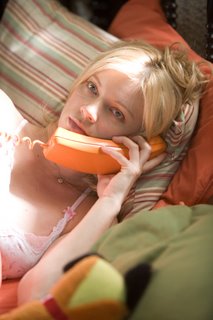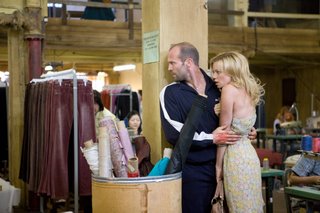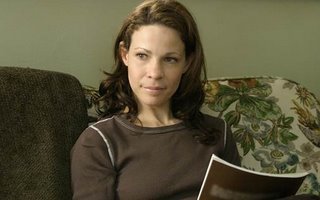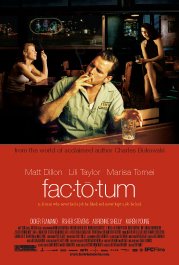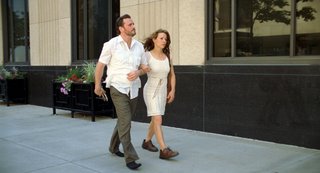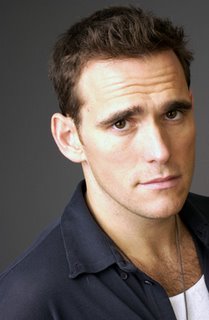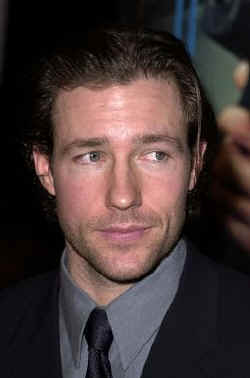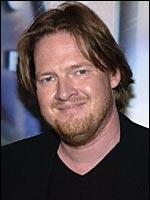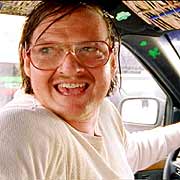Kirby Dick & Eddie Schmidt: This Film is Not Yet Rated
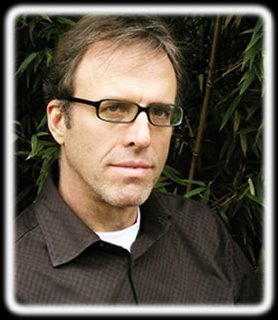 Q: So do you think once this film's out, you'll ever be able to get another movie rated?
Q: So do you think once this film's out, you'll ever be able to get another movie rated?Kirby Dick: "We'll see, we'll see. On the blacklist we've risen to the top. (laughs) I think what it all comes down to is: if the film makes money, I'll be good. "
Q: I take you've had run-ins with the MPAA?
KD: Yes, in a sense, yes -- not in terms of any of my films getting rated in ways that I didn't want them to get rated. But "for many years, I, like many film makers, have been pretty upset with the way that the ratings have been administered, in particular, the art films get such stringent ratings. I've wanted to make something on the MPAA and it's rating system for many years but because they are so secretive, all I could [conceive] of making was a clip film of interviewing film makers and hearing their experiences." And then when Eddie and I hit upon the idea of hiring a private investigator, we realized that this really could make the film because we could follow the arc of this PI. You're sort of in a cinema verite fashion which is where we come from. And also, if we outed the raters, we'd be able to hit at the core of the secrecy. So, yeah, I've had it in for this rating system for a long time.
Q: Isn't that a really strong bias to hire a private investigator to find certain things? It's like she found what you wanted to find.
KD: What she found was just facts. The facts that everyone should know about -- if this rating system is for the public [then] it should be [made] public. In Western Europe rating system, everyone knows who the raters are, so what she did was something [the MPAA] should've done a long, long time ago; what many journalists have tried -- you know 60 Minutes, Nightline -- and were unable to do and finally, we were able to do. I mean, this was something that should've been out many years ago.
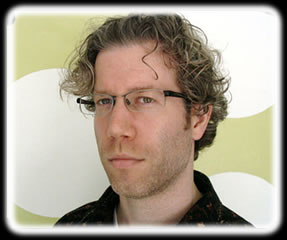 Eddie Schmidt: "It's interesting that you ask about the bias. We didn't want to -- at first we wanted to research the film in the traditional way but the MPAA doesn't release the information on how films are rated. You can't get a file and see how they voted on, like, Mission: Impossible, you can't do that, it doesn't exist." I mean it exists up until around 1969 or something, if you go to the Academy library, and then it's cut off as soon as Jack Valenti takes over. So, there's no way to find out about the processes since the raters are kept secret, unless someone really wants to go out on a limb, you can't talk to them. I mean when we were trying to find raters -- some raters would say "I can't talk to you, how did you get this number?" And even if you were like 'I just want to know about your experience' they'd say 'I had a great experience but I can't talk to you.'
Eddie Schmidt: "It's interesting that you ask about the bias. We didn't want to -- at first we wanted to research the film in the traditional way but the MPAA doesn't release the information on how films are rated. You can't get a file and see how they voted on, like, Mission: Impossible, you can't do that, it doesn't exist." I mean it exists up until around 1969 or something, if you go to the Academy library, and then it's cut off as soon as Jack Valenti takes over. So, there's no way to find out about the processes since the raters are kept secret, unless someone really wants to go out on a limb, you can't talk to them. I mean when we were trying to find raters -- some raters would say "I can't talk to you, how did you get this number?" And even if you were like 'I just want to know about your experience' they'd say 'I had a great experience but I can't talk to you.'"We wanted to talk to people within the studios who were able to work the system well, they didn't want to talk because they didn't want to lose their jobs." And we tried to get interviews with Dan Glickman and Jack Valenti and we got no response at all -- there was an effort made to try to get their side of the story but they don't want anyone to examine the system at all so there's really no way to get their side of the story.
Q: I agree that the system's screwed up in some ways but did it ever come up to mention the Senate hearings a decade or so ago wherein the studio heads were getting screamed on by the public? Did you ever think of looking into why the studios don't want to back off of the MPAA system? Did you guys realize that those hearings were something to talk about?
ES: Yeah, we were aware of that, but they were being chastised for their marketing -- it had to do with their advertising and kids seeing advertisements for R rated films so we don't cover advertising. We're covering the arc of the film, itself, going through the process and having scenes from it excised so that the actual work of art gets altered, so we don't really cover the marketing side.
Q: Well, when a studio looks at a movie, they also look at what they can use for advertising because the MPAA also governs their market.
ES: They do, that's totally true. I had a background in [editing] trailers so, I knew about all of the marketing stuff and it would've been another film. The congressional stuff we actually did look at -- had copies of the transcripts and looked at it -- but it had more to do with what time television spot's in and what kids saw of certain things at certain times. It didn't have [anything] to do with the ratings board because the trailers are administered by MPAA execs, not by the ratings board -- they don't weigh in on the trailer decisions. So you're right, it is significant but we thought it was significant in that it had to do with marketing.
Q: There was also something in there about censorship but isn't censorship more of an issue with the government, rather than the MPAA because they can't censor, according to the definition of the term?
KD: Well, they do though. I mean censorship can be economics, censorship can be the government -- there's only one ratings system, one major ratings system in this country. If the MPAA gives the rating of NC-17, it restricts how that film gets out into the marketplace. I think we should back up here just a little bit. The MPAA, I think, really don't cares whether there's ratings or not but if there is going to be a rating system, they want to control it. Because they want to make sure that their films get out to the widest possible audience and so they make the most amount of money. They tend to make films that are more targeted towards adolescents, films that tend to have more violence -- those films get less restrictive ratings. And their competition's films which are foreign films and independent films often have much more adult sexuality -- those films get more restrictive ratings. So they've set up a system where their films can get through and they can make more money and their competition's films are hurt. Now, you can call that censorship, you can call that restraining trade, you can call it whatever you want to call that. But that's the net effect of this. Remember, the MPAA controls 95% of the film business -- I mean, pretty much they run the show. This is what this film is taking issue with: if they're going to set up a system, then set up a system that's open. Why not have it open? What are they hiding? There's no reason not to have it open -- set up a system that's fair. And then we can discuss whether the specifics of the ratings are appropriate or not. If there's a problem.
ES: The studios know which video chains and theater chains won't carry certain [types of] films with certain restrictive ratings. And they're also, since they're controlling 95% of the business, they're putting money into films with contracts where directors are beholden to a certain rating. Then they're also setting up the system that administers the ratings, so, you're pretty caught. If that's not de facto economic censorship [then what is]?
KD: And the last thing is that "the studios, they claim that the raters' names are kept secret is to protect them from [any outside] influence but the studios are the only people who have access to [the raters]. Heads of production, post-production supervisors have an ongoing relationship with these people -- it's like what Matt Stone [Southpark co-creator] said, it's been corroborated time and time again, if it's a studio film -- you're given advice even before you submit your film -- there's a dialogue that goes back and forth through the entire process - [with] the independent film makers, you have no clue. In fact, because there's so little information that gets out all of the film makers who got NC-17 in our film, that we interviewed were all trying to make an "R" rated film, in fact they had because there are no standards published -- they don't have this access to find out. If they were working with a [major] studio this would not have happened."
Q: Essentially you're saying that it's like it was in the early days of American cinema when the major studios formed cartels with movie houses across the country to keep out foreign competitors?
KD: I think so -- the ratings are just one aspect of it. Again, they look at every aspect of the business to maximize profit and this is one of the ways that they can do it.
Q: Is there one ratings system in particular that you'd like to implement other than the one that we have now?
 KD: "I feel that the most important thing is that the information about what is in a film gets out -- the parents can make the decision. Right now, without written standards, these lettered ratings do not mean a whole lot and parents know that. Terry Webb, who's associated with UCLA, her studies bore out the fact that there are many R-rated films that had much less violence in them than [some] PG-rated films. It's not a professionally developed set of standards. They don't have experts on the board [of directors] and so it's a very haphazard, in that way -- very subject to outside influence, again, because it's secret. I would like to see an open system, experts on the board, written standards. I'd like to see a system where you can make a film for adults and not get an NC-17 rating that stigmatizes it. Perhaps there should be a rating between the R and the NC-17; in other countries you could get an 18-plus, certainly there's a lot of press around it, but it doesn't stigmatize it. Here, it very severely impacts it."
KD: "I feel that the most important thing is that the information about what is in a film gets out -- the parents can make the decision. Right now, without written standards, these lettered ratings do not mean a whole lot and parents know that. Terry Webb, who's associated with UCLA, her studies bore out the fact that there are many R-rated films that had much less violence in them than [some] PG-rated films. It's not a professionally developed set of standards. They don't have experts on the board [of directors] and so it's a very haphazard, in that way -- very subject to outside influence, again, because it's secret. I would like to see an open system, experts on the board, written standards. I'd like to see a system where you can make a film for adults and not get an NC-17 rating that stigmatizes it. Perhaps there should be a rating between the R and the NC-17; in other countries you could get an 18-plus, certainly there's a lot of press around it, but it doesn't stigmatize it. Here, it very severely impacts it."ES: "You know, in every other Western European nation, the ratings board members are known to the public -- they're only kept a secret here. I mean the secrecy, it just, I mean in a democracy, secrecy of any kind where it relates to the public -- public good, public interest -- is generally bad."
KB: I mean if it's for the public, it should be public -- look what's happening with the Bush administration.
Q: - set standards by who?
KB: That's a good question and "I think to develop a professional set of standards takes time. Obviously, there are constituencies that would have to weigh in...I agree that there are parents that don't want their children to see certain films, there are adults who don't want to see certain films. The should know what is in those films so that they can make that choice. I don't think it should just be Matt Stone and Martin Scorsese making the system, I think it should be the entire range of the industry, outside the industry as well. I completely agree with that. And I think it would take some time...Keep in mind, kids do [eventually] see the films here -- they see them on DVD. The MPAA has set up a system here where they get to see the same film twice -- the R-rated version or the NC-17 version, then the unrated version that comes out on DVD. Again, this is another way that they're very cleverly using the ratings system to maximize profits. "
ES: -- and I do think that -- if you think of it this way -- if they're seeing three films a day and they're mostly seeing Hollywood films, Hollywood knows how to market its violence in a certain way. So, if you're conditioned to seeing, let's say, certain cliches to the genre, or an actor that you know well who you know is going to triumph in the end, you might be inclined to take that content in a different way than for a film that you're not familiar with where the tone is a little different and you think 'oh, this film doesn't -- you may not even be fully conscious of it -- that it's following the subconscious rules of Hollywood film making. Therefore, it is going to be under a stricter standard and I think that applies to both foreign films and independent films that deal with more edgier topics or may have a more gray area of tone, it's not black and white -- it's more adult. I think that's where you're finding those films having trouble because they're being held to standards that are for 17 and under, very clear cut, black and white: not challenging."
Q: What would you want people to take from this film?
KD: I would like people to -- I mean this film deals with ratings but it also deals with other issues too like history of the House of Un-American Activities...I think for too long people, even academics, have looked at the film business in terms of stars, grosses and directors. I want people to look at this industry just like any other industry and realize that it's a bottom line business -- that's what business is -- and oftentimes they make decisions that are not in the best interests of the public. I want that critique to be out there, this information to be out there because right now Hollywood is a marketing industry and they market themselves very, very well and this is just a little bit of a wakeup call, I think.
Q: You said in the film that a lot of the hit films made in the 70's (A Clockwork Orange and Deliverance come to mind) wouldn't have even been made these days. Do you think the current political climate that the country's in right now has allowed what goes on at the MPAA to be even more pervasive than at any other time?
KD: I think that that's a part of it but I think in the 70's the studios were interested more in making art movies, taking chances -- they're not anymore. They've got a formula now that's much more geared towards adolescents and that's where they see their money is. They don't even want their film makers going out in that [artistic] direction except for maybe to make a few Academy nominated films. I don't even see a film studio making a Midnight Cowboy or anything like that -- that's all changed...Films can be made for any audience and everybody has a right to see whatever film they want to, that's all we're saying. We want you to have access to the films that you'd want to see...that's all we want.
ES: And I think that as far as what you were asking, why Deliverance would get rated more harshly today, is because the system won't allow us an opening. You know John Waters asked in the film if he got a harsher rating because the Abu Gharaib pictures were released a week before they viewed [A Dirty Rotten Shame] -- it's because the system's closed, there's no way for us to tell.
This Film is Not Yet Rated opens in LA & NYC today.
